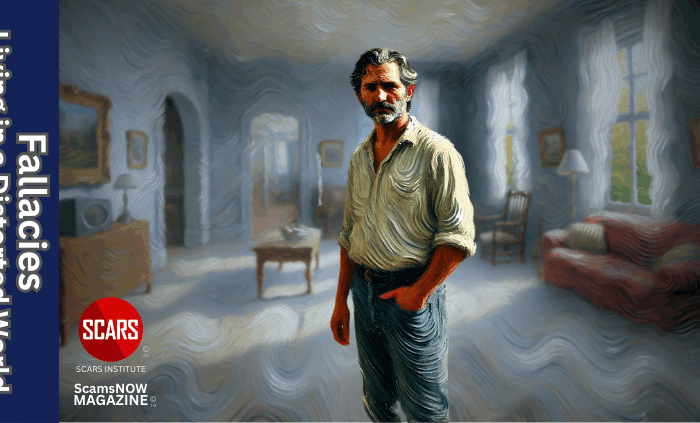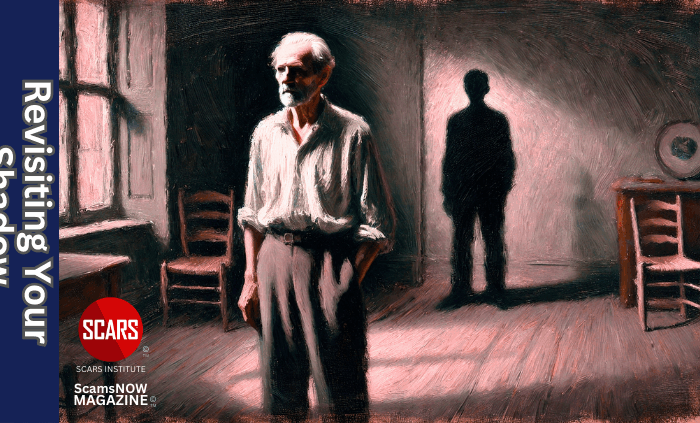The Tao – The Philosophy of the Path to Recovery
By Tim McGuinness, Ph.D. – Anthropologist, Scientist, Director of the Society of Citizens Against Relationship Scams Inc.
Tao – This is the Way
A relationship scam is a vicious crime that has the potential not only to be devastatingly traumatic but can almost destroy the very soul of its victims. The Tao – the way – offers an approach to recover from the crime and the devastation to the self that the scam inflicts.
Taoism (or Daoism) is a term for philosophies that emphasize harmony with the Tao (Chinese: 道; pinyin: Dào; literally: “the Way”) which is seen as the principle which is the source, pattern, and substance of everything that exists. In other words the Tao is the pathway to balance.
Tao – in our contextualization relating to scam victims, this is the way – the pathway that scam victims can follow to return to their self – to their balance.
There are also non-Tao paths that lead to anger & rage, to denial and shame, and to sustained internal injury. SCARS rejects these paths.
Taoism tends to emphasize virtues such as wu wei (effortless action), ziran (naturalness), pu (simplicity), and spontaneity while placing less emphasis on norms and ritual – when we speak about rituals, we mean pointless rituals instead of profound rituals. This helps form a part of the philosophy of recovery for all those that go through a recovery process (or should.)
Finding The Path Of Tao
Taoism is a philosophy that emphasizes living in harmony with the natural world and with oneself.
Tao teaches that the key to happiness and well-being is to go with the flow of life and to accept things as they are, and not as our biases would have us believe they are.
This philosophy can be helpful for traumatized crime or scam victims in a number of ways.
Tao: Acceptance
One of the most important things that a traumatized person can do is to accept what has happened. This does not mean that they have to like it or agree with it, but it does mean that they need to acknowledge the reality of their situation. Taoism teaches that we cannot change the past, so we need to learn to accept it and move on. This can be a difficult process, but it is essential for healing.
Tao: Grief
Trauma can also lead to feelings of grief. This is a normal and healthy response to loss. Taoism teaches that grief is a natural part of life and that it is important to allow ourselves to feel it. Bottling up our emotions can only make them worse. Instead, we need to express our grief in a healthy way, such as through talking to a therapist, journaling, joining a SCARS Support Group, or spending time in nature.
Tao: Letting Go
Once we have accepted what has happened and allowed ourselves to grieve, we can start to let go of the past. This does not mean that we forget what happened, but it does mean that we no longer let it control our lives. Taoism teaches that we can only be truly happy when we let go of our attachments, including our attachments to the past.
Tao: Balance
Taoism also emphasizes the importance of balance in all aspects of life. This means finding a balance between work and play, between activity and rest, between giving and receiving, and even between sadness and happiness or trauma and joy. When we are out of balance, we are more likely to experience stress, anxiety, and depression. Trauma can also throw us off balance, so it is important to focus on restoring balance in our lives as we heal.
Tao: Nature
Taoism teaches that we can learn a lot from nature about how to live in harmony with the world around us. Spending time in nature can help us to relax, de-stress, and connect with our inner selves. It can also help us to appreciate the beauty of the world and to see the interconnectedness of all things. This is a form of Mindfulness.
Tao: Compassion
Taoism also teaches the importance of compassion for oneself and for others. When we are traumatized, it can be easy to become self-absorbed and to focus only on our own pain. However, Taoism teaches that we need to extend compassion to others, even those who have hurt us. This can help us to heal, forgive ourselves and those that hurt us, and to move on so that we can learn to manage our trauma.
Tao: Practice
The philosophy of Taoism can be helpful for traumatized crime or scam victims, but it is important to remember that it is not a quick fix. It takes time and practice to integrate these principles into our lives. However, if we are willing to put in the effort, Taoism can offer us a path to healing and recovery.
Daily Tao
Here are some Tao practices that traumatized scam victims could use each day to guide themselves along the path to recovery:
- Meditation: Meditation can help to calm the mind and body, reduce stress and anxiety, and promote relaxation. There are many different types of meditation, so you can find one that works best for you. Always remember the SCARS Affirmations which can be a quick kind of meditation to calm the mind when triggered – you can say them as a mantra of 3 repetitions of one affirmation then the next.
- I am a survivor – repeat repeat
- It was not my fault – repeat repeat
- Qigong: Qigong is a Chinese practice that combines physical postures, breathing exercises, and meditation. It can help to improve circulation, boost the immune system, and reduce stress.
Qigong (pronounced chee-gong) is a mind-body practice that originated in China thousands of years ago. It combines slow, gentle movements with focused breathing and mental concentration. Qigong is often translated as “energy cultivation” or “life force cultivation.”
The goal of Qigong is to improve the flow of qi (pronounced chee), which is believed to be a vital energy that flows through the body. Qigong is said to have a number of health benefits, including reducing stress, improving circulation, and boosting the immune system.
There are many different types of Qigong, each with its own focus and set of movements. Some popular types of Qigong include:
-
-
- Medical Qigong: This type of Qigong is used for therapeutic purposes, such as reducing pain and improving sleep.
- Martial Arts Qigong: This type of Qigong is used to improve strength, flexibility, and coordination.
- Daoist Qigong: This type of Qigong is based on the philosophy of Daoism and focuses on cultivating spiritual energy.
- Buddhist Qigong: This type of Qigong is based on the philosophy of Buddhism and focuses on compassion and mindfulness.
-
Qigong can be practiced by people of all ages and fitness levels. It is a safe and gentle practice that can be done at home or in a group setting.
- Tai chi: Tai chi is a Chinese martial art that combines slow, graceful movements with deep breathing. It can help to improve balance, flexibility, and coordination, as well as reduce stress and anxiety.
- Yoga: Yoga is a mind-body practice that combines physical postures, breathing exercises, and meditation. It can help to improve flexibility, strength, and balance, as well as reduce stress and anxiety.
- Nature walks: Spending time in nature can help to reduce stress, anxiety, and depression. It can also help to improve mood, boost energy levels, and promote relaxation.
- Journaling: Journaling can be a helpful way to process emotions, understand your thoughts and feelings, and develop coping mechanisms.
- Talk therapy: Talking to a therapist or counselor, or in a Talking Circle Style Support Group can be helpful for traumatized scam victims. A therapist can provide support, guidance, and help you to develop coping mechanisms.
It is important to find practices that you enjoy and that you can stick with. It may also be helpful to talk to a therapist or counselor about which practices would be most beneficial for you. What a scam victim should never do is listen to the advice of scam victims that have lost themselves to anger or denial!
Here are some additional tips for traumatized scam victims:
- Be patient with yourself. Recovery takes time. Don’t expect to feel better overnight.
- Don’t isolate yourself. Spend time with loved ones and supportive friends. If you are in a support group make sure you are participating regularly.
- Take care of yourself. Make sure you are getting enough sleep, eating healthy foods, and exercising regularly.
- Set realistic goals. Don’t try to do too much too soon. Start with small goals and gradually increase them as you feel better. Whatever path you take down the road to recovery will take months to reach a reasonable state of balance.
- Seek professional help if needed. If you are struggling to cope with the effects of trauma, please reach out to a therapist or counselor, and a professional support provider such as SCARS for support.
Tao: Learning
There are many things that someone can learn about Tao or Taoism to get the most benefit from it.
Here are a few suggestions:
- Read the Tao Te Ching: The Tao Te Ching is the foundational text of Taoism. It is a collection of short, poetic passages that offer insights into the nature of reality and the Dao (pronounced “dow”), which is the ultimate source of all things.
- Study the teachings of other Taoist masters: There are many other Taoist masters who have written about the Dao and its principles. Reading their works can help you to gain a deeper understanding of Taoism. There are many of them on YouTube. Here are a few:
- Practice Taoist meditation: Taoist meditation is a way of calming the mind and body and connecting with the Dao. There are many different types of Taoist meditation, so you can find one that works best for you.
- Engage in Taoist arts and practices: Taoism has a rich tradition of arts and practices, such as tai chi, qigong, and calligraphy. Engaging in these arts and practices can help you to cultivate the Taoist way of life. Any form of deeply immersive art or creativity will do, including LEGO
- Spend time in nature: Taoism teaches that we can learn a lot from nature about the Dao. Spending time in nature can help you to connect with the Dao and to experience its peace and tranquility.
- Be open-minded and receptive: Taoism is a complex and subtle philosophy. It is important to be open-minded and receptive to its teachings if you want to get the most benefit from it. This especially speaks to being aware of your cognitive biases, knowing when they emerge in your thinking, and how to recognize them and nullify them.
Learning about Tao or Taoism can be a lifelong journey. There is always more to learn and experience. The most important thing is to be patient, persistent, and open-minded. With time and practice, you can discover the many benefits that Taoism has to offer.
-/ 30 /-
What do you think about this?
Please share your thoughts in a comment below!
More ScamsNOW.com Articles
-/ 30 /-
What do you think about this?
Please share your thoughts in a comment above!
SCARS LINKS: AgainstScams.org RomanceScamsNOW.com ContraEstafas.org ScammerPhotos.com Anyscam.com ScamsNOW.com
reporting.AgainstScams.org support.AgainstScams.org membership.AgainstScams.org donate.AgainstScams.org shop.AgainstScams.org
youtube.AgainstScams.org linkedin.AgainstScams.org facebook.AgainstScams.org
ARTICLE RATING
TABLE OF CONTENTS
CATEGORIES
MOST POPULAR COMMENTED ARTICLES
POPULAR ARTICLES
U.S. & Canada Suicide Lifeline 988
![NavyLogo@4x-81[1]](https://scamsnow.com/wp-content/uploads/2025/04/NavyLogo@4x-811.png)
ARTICLE META
WHAT PEOPLE ARE TALKING ABOUT LATEST SITE COMMENTS
See Comments for this Article at the Bottom of the Page
on Arts and Crafts Can Significantly Aid in Recovery for Scam Victims – 2025: “I did not realize that things I like doing very much—knitting or sudoku—were so helpful in my recovery process. The…” Jul 14, 11:28
on Projection And Scam Victims: “The moment I realized I had a financial loss due to a scam I realized that I felt shame, guilt,…” Jul 13, 19:12
on Japanese Legend of Tears – When There Are No Words – 2025: “After discovering the fraud, the pain was enormous. I shed oceans of tears, but I always tried to do it…” Jul 13, 10:50
on The SCARS Institute Scam Victim Recovery Timeline – 2025: “Wow. I umm experienced some of the later curves. I have been bouncing back and forth between asking myself why…” Jul 11, 00:01
on Transference And Emotional Danger After The Scam – 2024: “Thank you for the kind but firm reminder that the person in the stolen profile photo has their own life.…” Jul 9, 01:26
on ‘Mental Defeat’ – The Unique Condition Of Giving Up – 2024: “Thank you for another great article. I can see from this article that mental defeat would be debilitating to a…” Jul 9, 00:49
on Trust: Romance Scams Betrayal And Scam Victims – 2024: “This provided valuable insight that I can identify with” Jul 8, 16:44
on A Scam Victim in Extreme Distress – Stopping the Pain – 2024: “Your trust issues are very understandable. We are very sorry this happened to you. We suggest that you contact an…” Jul 8, 14:42
on A Scam Victim in Extreme Distress – Stopping the Pain – 2024: “My online counselors advised me to check myself in. I went to the hospital because I was suicidal. After I…” Jul 8, 13:44
on Scam Victim Catastrophizing Making Recovery Difficult 2024: “Excellent article on catastrophizing. I can understand how this could take a person down a rabbit warren of never ending…” Jul 8, 12:12
on The Self-Pity Trap & How To Overcome It – 2023 – [UPDATED 2025]: “I am not in the habit of feeling sorry for myself. After the deception, although it was not easy at…” Jul 8, 11:49
on Pride – A Dual Edged Sword For Scam Victims – 2023 [UPDATD 2024]: “Looking back over my life I have seen how pride has impacted me both positively and negatively. However the negative…” Jul 8, 09:08
on The Self-Pity Trap & How To Overcome It – 2023 – [UPDATED 2025]: “I felt self-pity while the enormity of my financial loss washed over me like a tsunami. The self-pity lasted only…” Jul 7, 18:55
on The Uniqueness Of Scam Victims Or Fraud Victims – 2024: “unfortunately all true. It is highly stressful dealing with the aftermath. I am being sued for the money I borrowed…” Jul 6, 12:50
on Scam Victims & Mental Health Blaming – 2023 [UPDATED 2025]: “For most of my life words have defeated me, made me feel insignificant, unwanted, unneeded. For this reason it is…” Jul 5, 13:36
on Substance Abuse Susceptibility And Scam Victims – 2024: “It is understandable how some would feel that alcohol or substance abuse would be helpful in handling their feelings after…” Jul 1, 20:36
on Scam Victims Use Work To Avoid Healing: “The last 6 years have been the most difficult of my life. The pandemic, having both parents in the hospital…” Jun 29, 18:38
on Entitlement Mentality And How Scam Victims Often Lose Their Path To Recovery – 2024: “Thank you for this discussion of entitlement. I can see from the descriptions listed that I have not felt entitlement.…” Jun 29, 18:22
on Samurai Wisdom and Rituals for Clearing the Mind After Scam Trauma – 2025 – [VIDEOS]: “A great guide on how to move forward in our recovery process with a calm mind, cleansed on an ongoing…” Jun 28, 07:34
Important Information for New Scam Victims
Please visit www.ScamVictimsSupport.org – a SCARS Website for New Scam Victims & Sextortion Victims
SCARS Institute now offers a free recovery program at www.SCARSeducation.org
Please visit www.ScamPsychology.org – to more fully understand the psychological concepts involved in scams and scam victim recovery
If you are looking for local trauma counselors, please visit counseling.AgainstScams.org
If you need to speak with someone now, you can dial 988 or find phone numbers for crisis hotlines all around the world here: www.opencounseling.com/suicide-hotlines
Statement About Victim Blaming
Some of our articles discuss various aspects of victims. This is both about better understanding victims (the science of victimology) and their behaviors and psychology. This helps us to educate victims/survivors about why these crimes happened and not to blame themselves, better develop recovery programs, and help victims avoid scams in the future. At times, this may sound like blaming the victim, but it does not blame scam victims; we are simply explaining the hows and whys of the experience victims have.
These articles, about the Psychology of Scams or Victim Psychology – meaning that all humans have psychological or cognitive characteristics in common that can either be exploited or work against us – help us all to understand the unique challenges victims face before, during, and after scams, fraud, or cybercrimes. These sometimes talk about some of the vulnerabilities the scammers exploit. Victims rarely have control of them or are even aware of them, until something like a scam happens, and then they can learn how their mind works and how to overcome these mechanisms.
Articles like these help victims and others understand these processes and how to help prevent them from being exploited again or to help them recover more easily by understanding their post-scam behaviors. Learn more about the Psychology of Scams at www.ScamPsychology.org
SCARS INSTITUTE RESOURCES:
If You Have Been Victimized By A Scam Or Cybercrime
♦ If you are a victim of scams, go to www.ScamVictimsSupport.org for real knowledge and help
♦ Enroll in SCARS Scam Survivor’s School now at www.SCARSeducation.org
♦ To report criminals, visit https://reporting.AgainstScams.org – we will NEVER give your data to money recovery companies like some do!
♦ Follow us and find our podcasts, webinars, and helpful videos on YouTube: https://www.youtube.com/@RomancescamsNowcom
♦ Learn about the Psychology of Scams at www.ScamPsychology.org
♦ Dig deeper into the reality of scams, fraud, and cybercrime at www.ScamsNOW.com and www.RomanceScamsNOW.com
♦ Scam Survivor’s Stories: www.ScamSurvivorStories.org
♦ For Scam Victim Advocates visit www.ScamVictimsAdvocates.org
♦ See more scammer photos on www.ScammerPhotos.com
You can also find the SCARS Institute on Facebook, Instagram, X, LinkedIn, and TruthSocial
Psychology Disclaimer:
All articles about psychology and the human brain on this website are for information & education only
The information provided in this and other SCARS articles are intended for educational and self-help purposes only and should not be construed as a substitute for professional therapy or counseling.
Note about Mindfulness: Mindfulness practices have the potential to create psychological distress for some individuals. Please consult a mental health professional or experienced meditation instructor for guidance should you encounter difficulties.
While any self-help techniques outlined herein may be beneficial for scam victims seeking to recover from their experience and move towards recovery, it is important to consult with a qualified mental health professional before initiating any course of action. Each individual’s experience and needs are unique, and what works for one person may not be suitable for another.
Additionally, any approach may not be appropriate for individuals with certain pre-existing mental health conditions or trauma histories. It is advisable to seek guidance from a licensed therapist or counselor who can provide personalized support, guidance, and treatment tailored to your specific needs.
If you are experiencing significant distress or emotional difficulties related to a scam or other traumatic event, please consult your doctor or mental health provider for appropriate care and support.
Also read our SCARS Institute Statement about Professional Care for Scam Victims – click here
If you are in crisis, feeling desperate, or in despair, please call 988 or your local crisis hotline.
More ScamsNOW.com Articles
A Question of Trust
At the SCARS Institute, we invite you to do your own research on the topics we speak about and publish. Our team investigates the subject being discussed, especially when it comes to understanding the scam victims-survivors’ experience. You can do Google searches, but in many cases, you will have to wade through scientific papers and studies. However, remember that biases and perspectives matter and influence the outcome. Regardless, we encourage you to explore these topics as thoroughly as you can for your own awareness.















![scars-institute[1]](https://scamsnow.com/wp-content/uploads/2025/04/scars-institute1.png)
![niprc1.png1_-150×1501-1[1]](https://scamsnow.com/wp-content/uploads/2025/04/niprc1.png1_-150x1501-11.webp)

This article is a good introduction to Taoism. Youtube has a number of good motivational speakers and their works in Tao Te Ching. I particularly like the one from the late Dr. Wayne Dyer. The title of the presentation in Youtube is “Tao Te Ching – Read by Dr. Wayne Dyer with relaxing Music & Nature Sounds”.
My 2nd read of this article was just as enjoyable as the 1st. I studied Chinese martial arts & philosophy in my youth and it has helped me all my life to get through tough situations.
Great article & advice. I now plan on re-reading my copy of the Tao Te Ching.